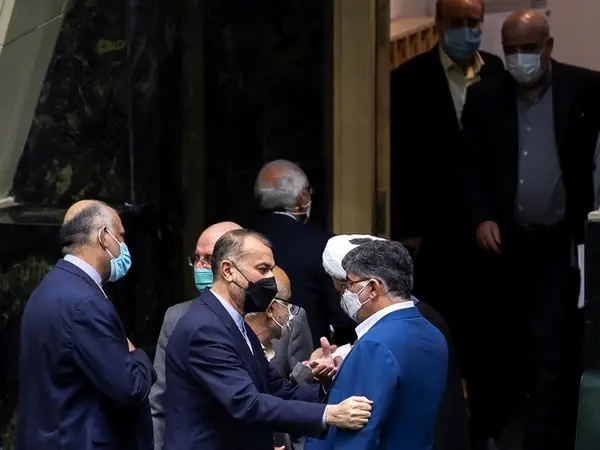Iran's foreign minister has told a closed-door parliamentary session that Tehran expects US "goodwill" and actions before it returns to nuclear talks.
Lawmakers speaking to media after Sunday's session said Hossein Amir-Abdollahian reiterated that Iran needs to see "serious steps" by Washington before it resumes talks suspended since June.
Alireza Salimi, a leading lawmaker quoted Amir-Abdollahian as saying that Iran's policy is "action for action". Earlier this month, the foreign minister had alluded to demands that Washington should unfreeze some of Iran's blocked funds before Tehran engages in contacts with the US.
Speaking to Tasnim news agency on Sunday, Shahriar Heydari, a member of the parliament's National Security and Foreign Policy Committee, said the foreign minister also thanked Parliament for ratifying a nuclear bill in December aimed at toughening Iran's bargaining position and said this will give the other parties a clear message and enhance the power of Iran’s negotiators.
The parliament passed an act entitled "Strategic Action Plan to Counter Sanctions and Protect Rights of the People Act" in December that obliged the government to step up Iran’s nuclear program further beyond the limits set by the 2015 nuclear agreement with world powers and to reduce Iran’s cooperation with the United Nations nuclear watchdog, the International Atomic Energy Agency (IAEA).
“By the Iranian foreign minister’s own admission, the 'Strategic Action Plan' has drawn the attention of influential countries,” another lawmaker, Behruz Mohebbi, tweeted after the meeting. He added that all parties to the agreement have received "a clear and serious message" and that the government" will have a "strong tool" in its hands in the upcoming talks.
Europeans have recently raised pressure on Tehran to resume the talks. On June 20, two days after the election of Ebrahim Raisi (Raeesi) to presidency, Iran suspended the talks that began in Vienna in April and has delayed its return despite repeated promises of resuming the negotiations “soon”.
Alluding to Iran's accelerating enrichment of uranium to higher fissile purity, a possible pathway to a nuclear bomb, diplomats from Britain, Germany and France, known as the E3, said in a note on Wednesday that the situation with Iran’s nuclear activities has been worsening since negotiations stalled in June.
During a visit by Enrique Mora, European Union’s lead negotiator on Iran’s nuclear issue Thursday, Iran agreed to meet with E3 representatives in Brussels in the coming weeks. According to lawmakers, in Sunday's closed session Amir-Abdollahian said talks with E3, Russia and China, the five remaining parties to the JCPOA, will begin in Brussels on Thursday [21 October]. This in effect would be circumventing the United States if no US representative travels to Brussels to be on the sidelines of the talks, as was the case in Vienna.
After the parliament's meeting with Amir-Abdollahian Sunday, lawmaker Alireza Salimi also quoted Amir-Abdollahian as saying that the Vienna talks must begin "from the point where Trump withdrew from the JCPOA". Former US President Donald Trump withdrew from the deal in 2018 and imposed tough sanctions on Iran.
According to lawmakers Amir-Abdollahian also tried to assure parliament that Iran will not be pressured by the economic hardship prevailing in the country and will seek alternatives to help people in their daily lives. This would be no easy proposition as US sanctions have deprived Tehran of tens of billions of dollars in oil export revenues.
A report by the Plan and Budget Organization prepared in August, before Hassan Rouhani handed the administration to Ebrahim Raisi, was published Saturday that paints a very grim picture of the Iranian economy if talks fail and US sanctions are not lifted.
According to the report, if sanctions continue, in 2024 the government will face bankruptcy and the national currency will lose value tenfold. The dollar may rise to as high as 2,840,000 rials in 2027. Currently the dollar is trading at 270,000 rials.
